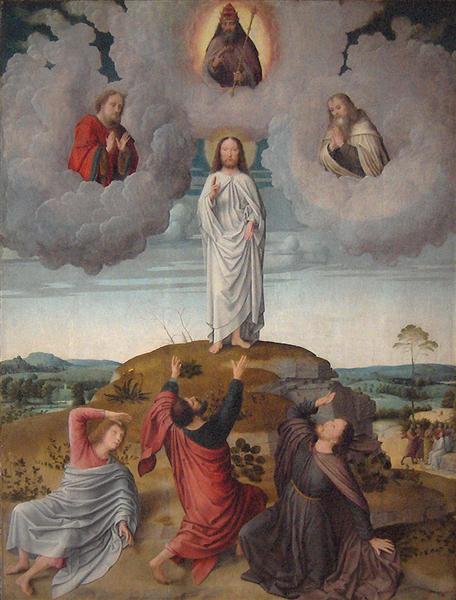The Story of the Transfiguration maps out some steps we need to take in our journey of prayer. First, we must climb the mountain; second, we must look upon Jesus; and third, we must go back down the mountain to tell others what we have seen.
First, we must climb the mountain. Before revealing his glory to Peter, James, and John, Jesus leads them up a high mountain. Climbing a mountain takes a good deal of effort. There’s always the danger of falling off a cliff or running into a wild animal. Also, the higher one climbs, the thinner the air is and the harder it becomes to breathe.
The apostles’ experience teaches us something profound about the spiritual life. God often does not reveal himself until we are willing to make the hard journey up the mountain. That mountain could be a sin that we have to overcome, an unhealthy relationship, or sickness. Every challenge we experience is an invitation from God to climb the mountain so that He can reveal His glory to us. We may not understand why God has put those obstacles in our path and made things so hard for us. However, if we ask Him, He will give us the strength to endure whatever may come. And, with time, we will see and be amazed by God’s mercy.
 The second truth of the spiritual life which the Transfiguration teaches us is that we are meant to see the vision of God. Unlike the apostles, we do not see Jesus face to face. How, then, do we get a glimpse of him in all his glory? The central and most important way is in the Mass. At every Eucharist, the Risen Lord is truly present in our midst. When the readings are proclaimed, it is Jesus’ voice that we hear. When we receive the Eucharist, we touch the body of the Risen Lord just as the apostles did, and we are transformed by him.
The second truth of the spiritual life which the Transfiguration teaches us is that we are meant to see the vision of God. Unlike the apostles, we do not see Jesus face to face. How, then, do we get a glimpse of him in all his glory? The central and most important way is in the Mass. At every Eucharist, the Risen Lord is truly present in our midst. When the readings are proclaimed, it is Jesus’ voice that we hear. When we receive the Eucharist, we touch the body of the Risen Lord just as the apostles did, and we are transformed by him.
For that reason, the Sunday Mass is an indispensable part of our Christian life and spirituality. While it is very good to read the Bible, pray the rosary, and contemplate the beauty of nature, none of those activities compare with the gift offered us in the Eucharist. While those activities can give us some insight into Jesus and his love, they cannot actually give us Jesus himself as the Eucharist does. There is no substitute for the real, life-changing encounter we have with the Risen Lord in the Sacrament of his Body and Blood which we receive every Sunday.
The third truth of the spiritual life is that we cannot stay on the mountain. We have to go back down to witness to others the Jesus we have come to know.
The experience the apostles had of Jesus was overwhelming. It filled them both with awe and fear. Understandably, Peter does not want it to end. He wants to stay there, camping out with Jesus, Elijah, and Moses forever. But Jesus does not allow it. The vision of his glory comes to an abrupt end, and he leads them back down the mountain to continue preaching the good news and healing the sick.
Many times, when we are praying and feeling God’s presence all around us, we do not want it to end. We want to stay basking in the warmth of God’s love. That is entirely natural because we were created to praise God and never feel so much “at home” as when we are praying. But it is not enough. The spiritual life is never just a private affair. From worship, we must go into service. We must come down the mountain and point out the way to encounter God to others so that they may share our joy.
Douglas Sousa, S.T.L. is an author for Liturgical Publications, Inc., and writes reflections on various topics, including reflections on Sunday readings.